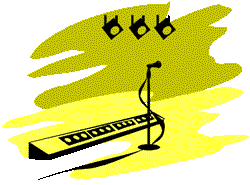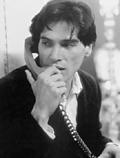FOR SOMEONE WHO has made much of his living as a rare records dealer, Chuck Warner is surprisingly dubious about his former profession. “There’s a cynical part of me that wouldn’t mind ruining record collecting,” says the 44-year-old with a laugh. “Given enough time to do this, everything can be made available for the equivalent of 30 cents.”
The “this” in question is Hyped to Death, the micro-indie label Warner runs out of his St. Louis home. And the “everything” he refers to are the mountains of rare vinyl his label brings back to light on over 40 compilations of obscure late ’70s and early ’80s punk, post-punk, and power pop. The usual suspects of the punk pantheon—Pistols, Clash, Wire—register only as distant influences here, while cult figures like the Swell Maps, Scritti Politti, Half Japanese, and the Velvet Monkeys are practically royalty. H2D series like Homework and Messthetics brim over with no-hit wonders and regional zeroes likes Dow Jones and the Industrials, from Indiana, and forgotten Londoners They Must Be Russians—bands that recorded little beyond a 7-inch single or two that were sold at gigs and consigned to local record stores.
Warner and another St. Louis collector, Bean Snicker Records‘ Paul J. Stamler, aren’t the first to start independent labels to reissue old, obscure music. But they’re among the first to take advantage of technology that has made it possible for any bedroom musician with a few hundred dollars to start his or her own record company and become a do-it-yourself archivist, with digital cleaning equipment taking the fuzz and crackle off the rare vinyl that’s reissued. Neither label is likely to overtake the likes of Rhino, Columbia Legacy, or Blood and Fire in the marketplace, but that’s not their aim. Instead, they reflect a longstanding commitment to exposing the hidden corners of music history, compiling rarities with the hidden-gem appeal of sets like Rhino’s Nuggets.
HYPED TO DEATH isn’t even Chuck Warner’s first independent label. That honor goes to Throbbing Lobster, which he ran during the late ’80s in his native Massachusetts. By that time, Warner had been selling music for a decade and a half, beginning with a summer job at a Harvard Square shop. He then graduated to a mail-order used-record business: “I’d buy records for 25 and 50 cents apiece and sell them for $2 each, running auctions for obscurities. The stuff I was selling was aggressively collector-oriented.”
Warner began his punk fandom in college, spinning Eddie and the Hot Rods and Ramones sides on the campus station at Yale and weekending in New York. He didn’t sell much of it, however, since punk hadn’t yet become a collector’s market. That changed in 1982, when he acquired an enormous amount of punk-related back stock from indie distributor Disques Du Monde. (“I probably still have 100 copies of the first dB’s single,” he says.) Gradually, he added these and other collections to an already bulging mail-order catalogue.
One frequent customer used titles he’d purchased from Warner to compile the bootleg punk-rarities compilation Killed by Death. Those titles quickly became the most sought-after items in Warner’s stock; in response, he began including mix tapes with his catalogs. “The cassettes were theoretically shopping aids; they were segued tightly together so you couldn’t bootleg them.” Unfortunately, customers sought only the songs on the tapes. Dismayed, and uncertain of what to charge anymore (“There’s still stuff available for 50 cents that’s better than the Peer Pressure single that goes for $800,” he laments), he got out of the mail-order business.
Then, a couple years ago, Warner purchased a CD burner to help produce his wife’s online astrology show and began manufacturing his encyclopedic titles. Though scattershot in quality, listening to the skinny-tie power-pop collected on Teen Line or the Midwestern post-punk of Homework brings a surprisingly durable charge. (Beginners should start with Homework #4, the most consistent of the H2D titles I’ve heard.)
Warner is also adamant about sharing his meager spoils with the bands themselves, via the “Bands Sign In Here” page on hyped2death.com, where he solicits the groups’ information and permission, albeit after the fact. “With the Internet, someone doing a bootleg could have something to give back to the band for use of the songs for the first time,” Warner reasons. “And because of the CD-R technology I can update the liner notes on a regular basis as information comes along.” He can also update the CDs according to the bands’ wishes; anyone who disapproves of their appearance on an H2D compilation can be removed at will.
IF HYPED TO DEATH answers the question of what all those forgotten indie-punk records sound like, the debut release of Stamler’s Bean Snicker label resolves a rather more disturbing mystery: What would Jiminy Cricket sound like singing smut? “She’ll think of it long after it’s gone/I’m gonna put it right where it belongs,” croons Cliff “Ukelele Ike” Edwards on “Give It to Mary with Love,” the (ahem) climactic track of Doity Records Vol. 1. For those who only know Edwards for his Disney voice-over work, the gusto with which he sings, “I’ll let her take it in her hand/’Cause I know she’ll stroke it so grand/Like Jack and Jill/We’ll both get a thrill” offers a clue of what else was growing besides Pinocchio’s nose.
The party records collected on Doity were as underground as any punk side, though far less obscure: Many of the CD’s inclusions were quite popular, if, as Stamler puts it, “semi-clandestine.” The 50-year-old Stamler began investigating the recordings five years ago, when a record dealer friend sold him some items on Pearl, one of the better known party labels. “I’d been interested in double- entendre material for years, ever since coming across an LP of English erotic folk songs sung by the great folklorist A.L. Lloyd,” he explains.
Stamler, who’d been collecting 78s since his Chicago childhood, dove headfirst into the field, eventually tracking down a number of titles on the Good Humor label, which provided all the new CD’s tracks. “Nobody is issuing this material now as far as I can tell,” he says. “It seemed like a good time, sociologically speaking, to launch a new reissue series.”
What’s most interesting about Doity is how the passage of time has tamed its once-outrageous material. In the ’30s and ’40s, records by drag queen Ray Bourbon and the anonymous male-female comedy duo Pure and Simple were sold under-the-counter; a record dealer risked arrest for carrying them. Today, the only eyebrow-raising thing about them is how corny they are. Ben Light and His Surf Club Boys’ “The Girl from Atlantic City,” for instance, is a leering parlor song: “Every morning she’d come/This trim little lass/And give us the pleasure/Of seeing her . . . antics in the water.” (Oh, Ben, you naughty boy!) But that quaintness is also frequently charming—Pure and Simple go about their groan-inducing routines with real flair. For historically minded students of comedy, it’s a valuable look at a forgotten era.
Stamler is hopeful that enough people will catch on to let him continue digging through his archives. “I’d like to do some anthologies that range all over the spectrum of 78s,” he says. “There’s a huge, huge world of music, comedy, and whatever out there, and I’d love to have the chance to expose more people to it.”








